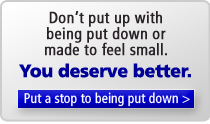Being More Confident Means Being More Scared
The 3rd Principle of Self-Confidence says that being truly confident doesn’t mean that you can’t not be confident.
What all those double negatives mean is that being confident doesn’t preclude you from being scared. Being truly confident means that it’s just fine for you to go beyond, to take another step into the unknown and scare the pants of yourself.
Being more confident means that you may just experience more fear.
 There are times when being confident means you’ll be shaking in your boots. There will be times when that voice in your head tells you to turn back, and there will be times when you wonder if you’re up to it at all.
There are times when being confident means you’ll be shaking in your boots. There will be times when that voice in your head tells you to turn back, and there will be times when you wonder if you’re up to it at all.
That might sound strange, especially considering that I’m a confidence coach and I keep banging on about how real confidence can transform your life in all kinds of ways, and you might be thinking, “Hang on just a second buster, the very reason I want to be more confident is so I’m not so scared all the time.”
I understand that, I do, but here’s the thing. Confidence and fear aren’t mutually exclusive states – they can exist in the same person at the same time. Here are a couple of quick definitions to explain –
Confidence: Being able to choose your behaviour with implicit trust in that behaviour, and knowing that you can deal with whatever happens.
Fear: Anticipation that you’ll lose out materially or emotionally by the outcome of a course of action.
You experience fear when you’re about to go out of your comfort zone, and it’s a voice that tells you all the things that can go wrong (whether real or imagined) and every way you can screw up or look stupid.
So if you’re engaging with the things that really matter to you, the things that demand you push yourself and take yourself beyond the confines of where you are and what you know right now, you’d better expect to have some fear along for the ride.
If you interpret being scared as not being confident, you’re wrong.
Fear is part of a being on a journey that matters.
Of course, there’s a zero to slim chance of you embarking on that journey in the first place without a sense of self-confidence and without a sense of what matters to you.
So here’s the exciting bit.
When you have true confidence that voice of fear doesn’t matter. You’ll hear it, sure, but your trust in your ability to make choices and to deal with whatever happens vastly outweighs it.
The voice of fear is still there, but that voice isn’t you.
Being confident means that you still hear that voice of fear and understand it, but it also means you know full well that you’re more powerful and resourceful than it could ever be.
Being confident gives you an inexhaustible supply of self-trust.
I think the trick here is to find ways to remember and connect with that confidence, especially when the voice of fear seems to be jumping up and down and yelling at you. The knack that truly confident people have is being able to connect with what they’ve got when the voice of fear threatens to overwhelm (and coincidentally, that’s just what my coaching method does).
Confidence and fear often go hand in hand, and can even complement one another. I always say that the best way to know if you’re onto something special is to ask yourself this question – “Am I scared AND excited?”
If you’re both scared and excited it means that not only are you pushing yourself, but you’re moving into a world that truly matters to you.
And how darn-tootin- jump-up-and-down-call-all-your-friends-with-a-cherry-on-top great does that sound?
- Other articles you might like:
- What do Insecure People Fear the Most?
- Confident People Never Ignore the Truth
- The (Un)Confident Leader
 Believe it or not, public speaking scares the crap out of me. My pulse quickens, my breath shortens and my palms get sweaty. But it hasn’t stopped me doing a whole bunch of it in my work over the years, and I’m working on doing a whole load more of it in 2009.
Believe it or not, public speaking scares the crap out of me. My pulse quickens, my breath shortens and my palms get sweaty. But it hasn’t stopped me doing a whole bunch of it in my work over the years, and I’m working on doing a whole load more of it in 2009.